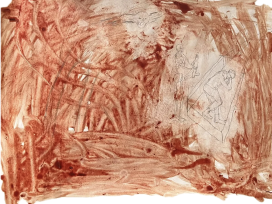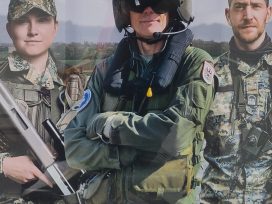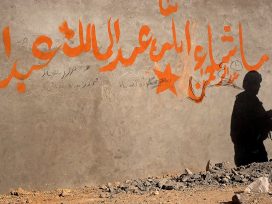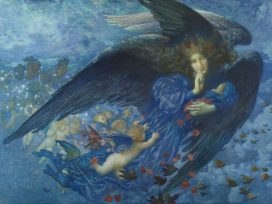How can we learn to live next to violent deaths, mass graves, and knowledge of rape and torture? When looking for an answer to this question, before Russia’s full-scale invasion of Ukraine yet after its occupation of Crimea and war in Eastern Ukraine, Nikita Kadan suggested we ‘measure contemporary art against the execution pit’. The artist wrote, ‘We have bones in common. Our skeleton is divided and piled in pits in the Donbas and Syria, in Sandarmokh in Karelia, the former Janowska Street in Lviv, on every continent, over the lines of state borders running across the earth’s surface. This is the secret unity of the world. We are brought together by the great International of Bones, a world assembly of burials. We are united in brotherly and sisterly graves.’
In Kadan’s vision, violence, going round in circles, shatters art’s vanity by creating more and more execution pits and mass graves, which at times turn into memorial sites, and at others do not. When facing history, art acquires a specific purpose: to bear witness to horror, making it tangible, making sense of it. Art, under this mission, can become a tool of solidarity in ‘a world assembly of burials’.
To be able to look into an execution pit, one needs bravery to face not only the victims but also the perpetrators and, at times, recognize one’s own people. Kadan’s reflection, written while developing a series of drawings about the Lviv Pogrom of 1941, coincided with Ukraine going through yet another round of reckoning with its history, where both victims and perpetrators were abundant. Victims were recognized; perpetrators were upsettingly avoided. Ukraine was already living with war and violent deaths at this time: in early 2014 in Kyiv, and then later in the east of the country. However, until two years ago, all those deaths were somehow distanced – some in time, others in space.
In 2023, talking about art in relation to war, curators Asya Tsisar and Natasha Chychasova shared an observation: ‘We are now very similar to those men and women from Crimea and Donbas who tried to explain something to the rest of Ukrainians in 2014. But we couldn’t hear each other because their pain was so intense, and our perception was so distant. After 24 February the whole of Ukraine turned into Donbas. And now there’s the whole world, or let’s say ‘imaginary Europe’, to whom we are trying to explain what we are going through.’
So how do we learn to live next to violent deaths when they become an immediate daily reality, and simultaneously try to explain to the world what we are going through? Both tasks are impossible, and yet still inevitable, inescapable. Both questions are what has been driving artists in Ukraine since 2022. Within these two concerns are many others that would have been considered non-urgent, deferrable, and even totally irrelevant just two years ago. This tight knot of questions is constantly snowballing. And, now, when everything, including art, is measured against execution pits, everything is urgent and nothing is deferrable.
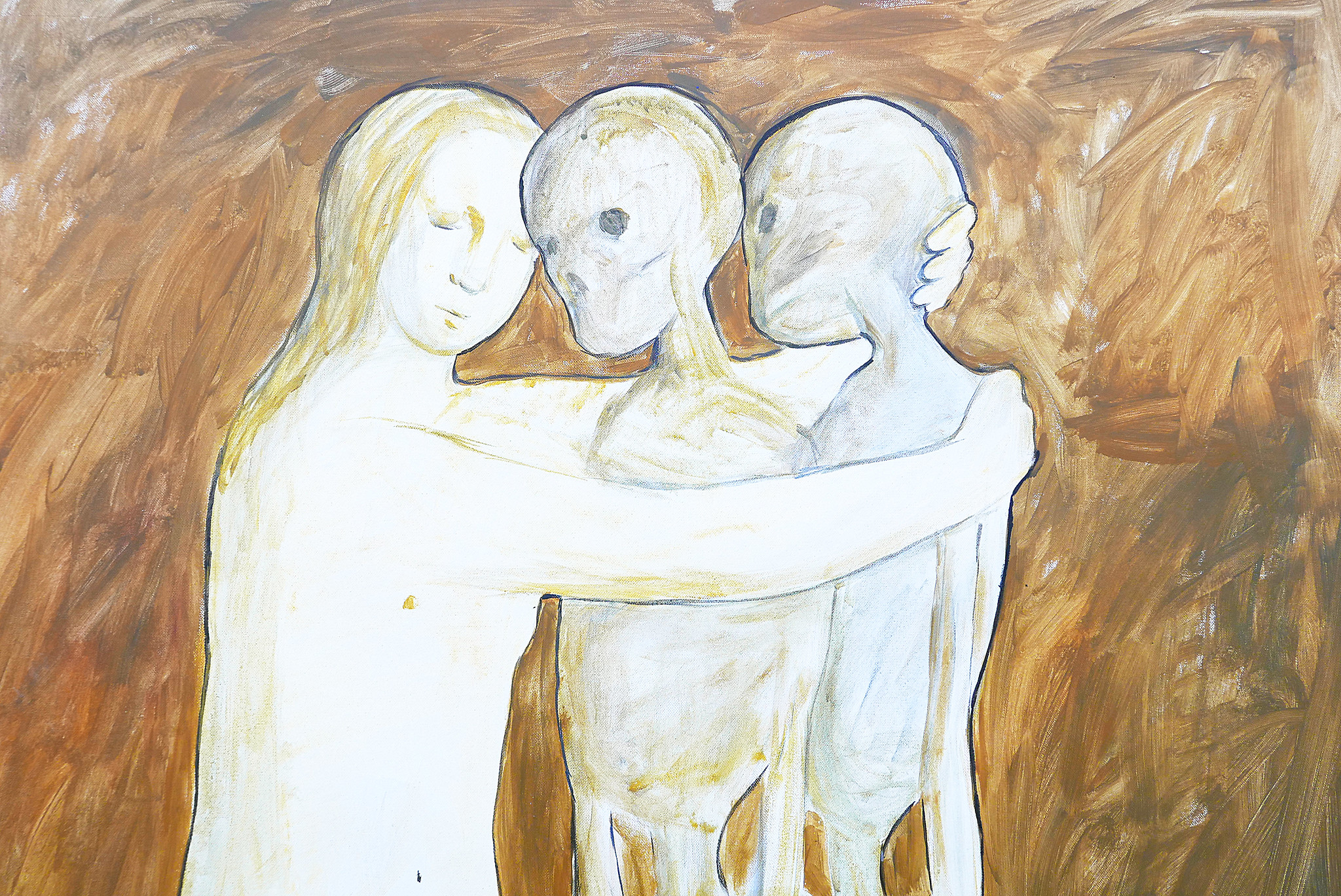
‘The Girl and the Dead’ by Kateryna Lysovenko, exhibited at the Naked Room in Kyiv. Image via Flickr.
Making sense of ‘everything’
A little less than two years ago, I wrote that the arts in Ukraine were defined by silence: ‘Ukrainian culture today is a void compiled of empty spaces that could have been filled with books, exhibitions and performances that did not happen – and most probably, will not happen for a long time.’ In the deafening shock of the first months after the invasion, the phantom pain of things planned, prepared, or imagined – elements from ‘a normal life’, which should have come back soon after an imminent Ukrainian victory – was still intense. Already in spring, after the liberation of the Kyiv region, after Bucha, Irpin and Chernyhiv, it became clear that nothing was coming back any time soon. Two years into the war, it is excruciatingly clear that the previous life is never coming back. Whenever it ends, this war will have changed us forever. This different life will require understanding and care. And apparently, it will need some intellectual sacrifices.
In a very intimate conversation recorded in the autumn of 2023, Ukrainian film directors Iryna Tsilyk and Maryna Stepanska shared their concern that the subject of war ‘held everyone hostage’ and wasn’t going away any time soon. They talked about a ‘cemetery of ideas’ that would never be realized, since they don’t address the needs of reality in ‘these new times’. But what are these new needs? Do they radically limit freedom of thought, expression, or creation? Do they open new horizons by presenting challenges unimaginable before the war? Do they bring a sense of urgency to unseen or neglected issues? Or all the above simultaneously, and ongoing, even though ‘we wish it would never have happened’?
In 2023 Ukrainian journalists Nataliya Gumenyuk and Angelina Kariakina started the podcast Koly vse maye znachennya, which has a beautiful double meaning: ‘when everything matters’ and ‘when everything makes sense’. Together with leading intellectuals from Ukraine and elsewhere, they reflect on the movement of geopolitical tectonic plates due to the war in Ukraine, and how this war is changing not only Ukraine but also the world at large. The title precisely captures the needs of new times when everything – literally everything – matters and has to be made sense of. Now, nothing can be postponed or left aside if these times are to be fully understood.
In its own rather perverse manner, the war has radically shifted horizons. Out of the initial fear of a void came a polyphony of voices trying to make sense of everything. What are they talking about? What is this everything?
Violence and compassion
For one, how do you live beside violent deaths, knowing you could be next? Moreover, how do you make sense of not only these deaths but also one’s own life? Intense debate, triggered in Ukrainian society after 2014 and accentuated after 2022, pits ‘ethics of struggle’ against ‘ethics of living’. Life, its values, social structures and social contracts are being constantly renegotiated for the struggle to make sense: a persistent, collective search for accurate and often practical meanings of notions such as solidarity, equality, dignity, agency, the daily shared pain of loss, rebuilding an understanding of society and a feeling of a collective ‘we’.
Regarding compassion and powerlessness while observing other people’s pain, Susan Sontag writes: ‘Compassion is an unstable emotion. It needs to be translated into action, or it withers. The question is what to do with the feelings that have been aroused, the knowledge that has been communicated. If one feels that there is nothing “we” can do – but who is that “we”? – and nothing “they” can do either – and who are “they”? – then one starts to get bored, cynical, apathetic.’ Compassion and sympathy, continues Sontag, allow observers of war crimes being committed elsewhere – separated from distant sufferers by their screens, providing the illusion of proximity without compromising safety – to reassure themselves that they are not accomplices to suffering.
When safety is already radically compromised, when there is no question of who the real perpetrators and their accomplices are, when there is no emotional and moral distance between those in pain and those observing their suffering, when pain, shared daily by everyone, becomes a social driving force, and when everyone feels utterly helpless but keeps going and doing because there is always ‘something we can do’, a very different, powerful, diverse and vocal unity of ‘us’ emerges. Looking at Ukrainian history in the violent and long twentieth century (prematurely called short), curators of a panoramic exhibition of Ukrainian art call it ‘Our Years, Our Words, Our Losses, Our Searches, Our Us’.
This collective body of resistance is also a collective body of memory, commemoration and a collective voice of struggle. From day one, artists began collecting evidence of pain and loss, fear and resistance. Over time, it became evident that artistic works are not just witness to and documentary evidence of crimes but they also weave memories. To withstand mass murders and mass graves, cultural memory strives to remember everyone and everything: names, faces, people, events, towns and landscapes that the war has tried to wipe out. Dedicated remembering has become an ethics of living. It is as if by not letting any present moment or any loss slip away, we are also trying to fight the blind spots of our long twentieth century – as poet Ivanna Skyba-Yakubova writes,‘to sew up black ruptures in the universe’.
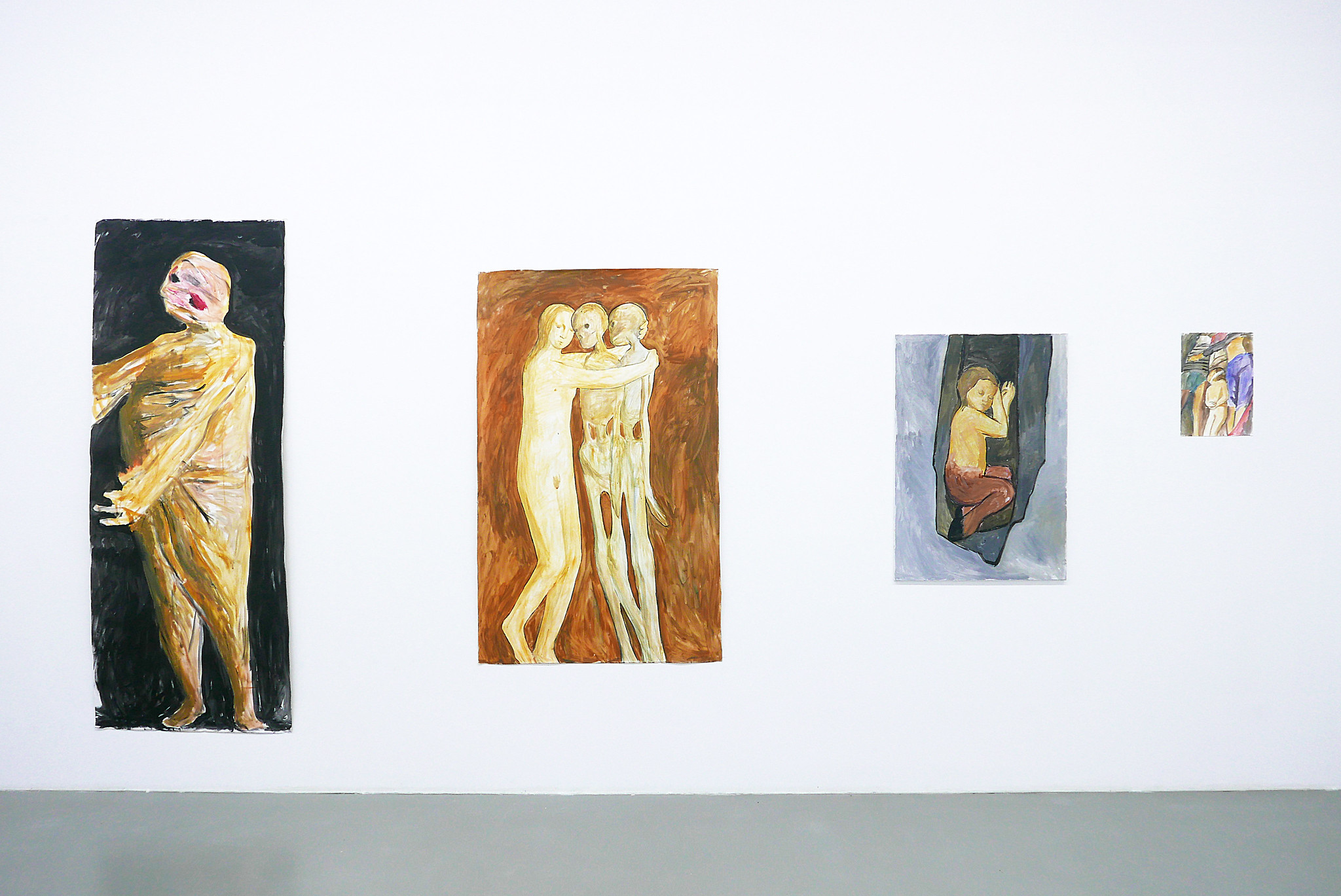
Kateryna Lysovenko’s work exhibited by Naked Room in Kyiv. Image via Flickr.
Dignity at stake
How do we remember those now gone forever without losing sight of those still present? For the first time since the last centuries’ two World Wars, Ukrainian society has been challenged to address the oceans of both injured and traumatized, and relocated people – veterans and refugees. How do we not pitch them against one another? How can we stop creating multiplying social ruptures, when still facing imminent danger, and start healing? Is it even possible to become a genuinely inclusive society without any perspective of attainable security? Can those living without it ever understand, accept and forgive those living securely elsewhere in the West? Will revenge ever bring peace to the dead and wounded? Is revenge a part of justice? Is justice even attainable?
Questions multiply in the blink of an eye. Yevhen Hlibovytsky, director of the recently opened Institute of the Frontier in Kyiv, built his keynote speech about Ukrainian sustainability in 2024 on a long list of questions society must face and make sense of. Among them: How do we understand victory? Is there space for compromise, and how can society negotiate it? How do we pursue the goal of EU integration while maintaining our strategic interests? Which interests and values are at the core of Ukrainian society now? How to stop this war from becoming a ‘counter-revolution of Dignity’?
The last one is undoubtedly crucial. Ten years ago the Revolution of Dignity became a turning point in a fight for democracy, rule of law, freedom and human dignity; one of the dangers of war is that it can overturn the revolution’s aims. The war Ukraine is fighting now is not just two-fold: as I wrote in 2022, it is a three-fold struggle unfolding in physical, symbolic and epistemological realms. On the main front, Ukraine is fighting a brutal and violent war against a Russian invader, an outdated empire that cannot let go of its imperial territorial and cultural claims, which is ready to eradicate the whole country for them. Ukraine also needs to take a stand against a West that still retains the power to name, to (re)present, to arm and to decide whose sovereignty is worth fighting for. And the internal fight for democracy and dignity continues: society withstands attempts to perceive and use people as resources. The frontier is here; it is within. Ukraine is no longer a frontier for Europe, between democracy and authoritarianism – it is a European frontier.
‘Old Europe, with all its complicated past, is now trying to put on a face, but the house of cards is falling apart. “Never again” no longer works, wars, terrorist attacks, and all other possible tools for the destruction of one people by another come again, and again, and again. Only their forms and technologies are now more modern and sophisticated. Sometimes, I think, in fact, we, the inhabitants of planet Earth, or much more narrowly, Europeans, are all interconnected and very vulnerable. It’s just that this time Ukrainians had to accept the fact of our total fragility and inability to think seriously about the future a little earlier than other Europeans,’ writes Iryna Tsilyk.
Voicing pain
Recognizing what being European means today is something radically different from what we, Ukrainians, used to imagine some years ago. Perhaps the new notion of being European is being forged in the trenches of Eastern Ukraine, in towns all over the whole country under the sounds of air raid alerts, in the voices of artists and intellectuals trying to make sense of all this. Who are we today bearing witness to this war? Who are we, rediscovering new meanings of home, landscape and community after those that have been damaged? Can we rearticulate the values of life, dignity, freedom and solidarity for ourselves, for everyone? Peace is not the absence of war. It is the presence of the collective voice of people demanding justice and sovereignty.
Ukraine Unmuted (or, in more direct translation from the Ukrainian, ‘Ukraine acquires its voice’), the title of the 3rd Congress of Culture in Lviv last autumn, could not be more precise. The painful and unjust yet inevitable process of the last two years has been to acquire the voice to speak for ourselves, to ourselves, and then to others, to acquire the voice as ‘the duty to ourselves, to those killed by Russia today and over the previous centuries, and to the rest of the world’. Out of silence comes a multiplicity of individual voices forming, as writer Anatoliy Dnistrovyi said in his keynote at the Congress, ‘a continuum of shared truth, common position which each of us shapes, strengthens and replenishes bit by bit with new testimonies, experiences and meanings.’ Culture returns to its mission of bearing witness and documenting, a tool to make reality graspable and meaningful, especially when meanings tend to fall away in pain – a hand stretched out in solidarity to others, fragile and injured, offering the utopian dream of ‘never again’.





